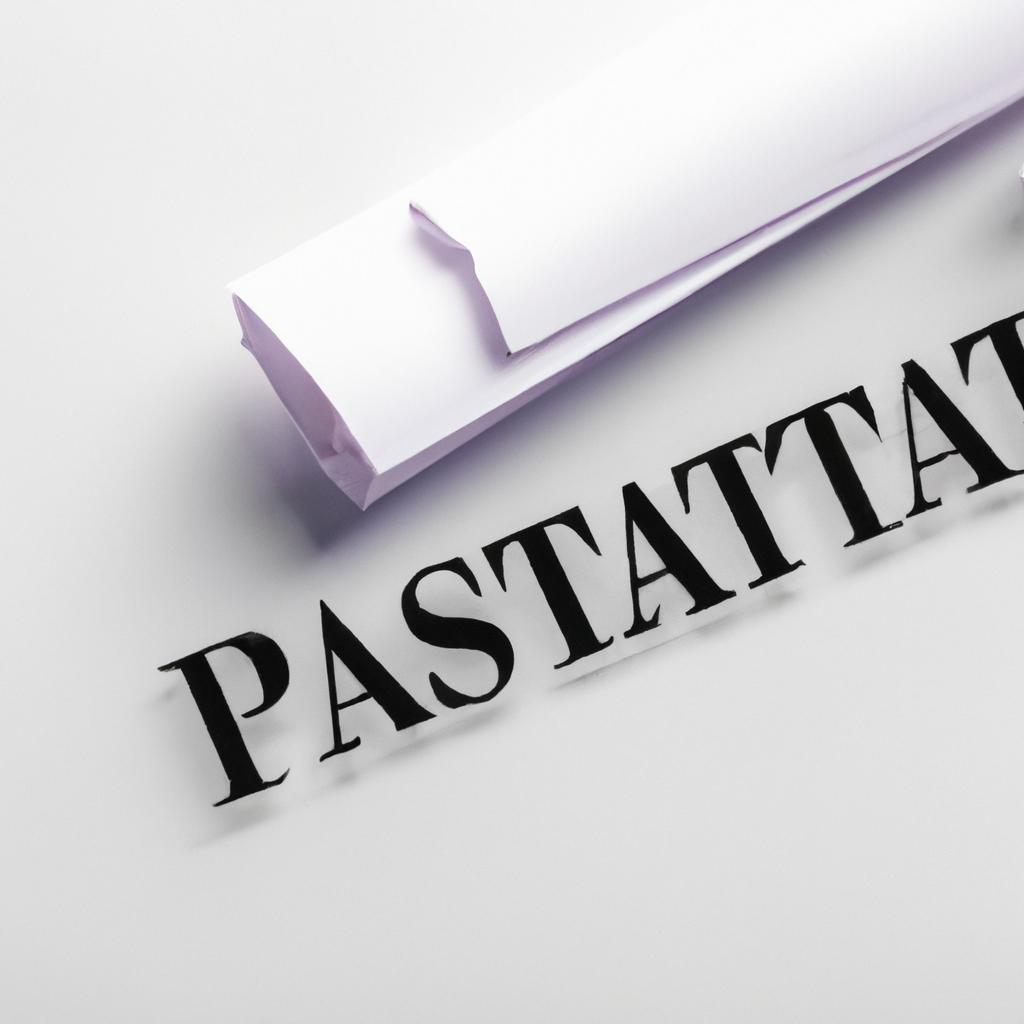In the intricate world of estate planning and administration, the terms “probate” and ”intestate” often loom large as critical concepts. As experienced legal professionals at Morgan Legal Group in the bustling heart of New York City, we understand the crucial distinctions between these two processes and the impact they can have on the distribution of assets after a person’s passing. Join us as we delve into the nuanced realm of probate versus intestate succession, unraveling the complexities and implications of each path in the realm of estate settlements.
Understanding the Key Differences Between Probate and Intestate Administration
When it comes to handling the distribution of assets after someone passes away, there are two main processes that come into play: probate and intestate administration. While both serve the purpose of settling an individual’s estate, there are key differences between the two that individuals should be aware of.
One of the main distinctions between probate and intestate administration is how the assets are distributed. In probate, the deceased individual’s assets are distributed according to their Will, if one exists. On the other hand, in intestate administration, the assets are distributed based on the state’s laws of intestacy since there is no Will to guide the process. This can often lead to unexpected outcomes, as the state’s laws may not align with the deceased individual’s wishes.

The Importance of Proper Estate Planning to Avoid Intestate Proceedings
Proper estate planning is crucial to avoid intestate proceedings that can occur if you pass away without a valid will in place. When someone dies intestate, their assets are distributed according to state laws, which may not align with their wishes. Intestate proceedings can lead to prolonged and costly legal battles among family members, causing unnecessary stress and tension during an already difficult time.
By working with experienced estate planning attorneys, like those at Morgan Legal Group, you can ensure that your assets are distributed according to your wishes. A comprehensive estate plan can also help minimize tax liabilities, protect your wealth for future generations, and provide for your loved ones in the way you intend. Don’t leave your estate to chance – contact us today to start the estate planning process and avoid intestate proceedings.

Navigating the Probate Process with Expert Legal Guidance
When a person passes away, their assets and properties may need to go through the probate process, which is the legal process of distributing their estate according to their will. If the deceased did not have a valid will in place, their estate will be distributed according to intestate laws. Understanding the key differences between probate and intestate can help individuals navigate the complex legal landscape of estate planning.
Probate:
- Requires court supervision
- Can be a lengthy process
- Assets are distributed according to the deceased’s will
- Can be costly due to court fees and legal expenses
Intestate:
- Does not require court supervision
- Follows state laws for asset distribution
- Assets are distributed to next of kin based on predetermined rules
- Can lead to disputes among family members

Maximizing Inheritance Benefits Through Strategic Estate Planning Strategies
When it comes to estate planning, understanding the difference between probate and intestate succession is crucial in maximizing inheritance benefits for your loved ones. Probate involves the legal process of validating a deceased individual’s will and distributing their assets according to their wishes. On the other hand, intestate succession occurs when someone passes away without a will, leading to the state determining how their assets will be distributed.
By utilizing strategic estate planning strategies, such as creating a comprehensive will or establishing a trust, individuals can avoid the costly and time-consuming probate process. Additionally, planning ahead can ensure that your assets are distributed according to your preferences, rather than relying on intestate laws. Consulting with an experienced estate planning attorney, like the experts at Morgan Legal Group in New York City, can help you navigate the complexities of probate and intestate succession to secure your legacy for future generations.
Q&A
Q: What is probate and intestate?
A: Probate is the legal process of administering a deceased person’s estate, while intestate refers to the situation where a person dies without a will.
Q: How does probate differ from intestate?
A: In probate, the deceased person’s will is used to guide the distribution of their assets. In intestate cases, state laws dictate how assets are distributed among heirs.
Q: What are the advantages of probate over intestate?
A: Probate allows for a more orderly distribution of assets and can help resolve disputes among heirs. It also provides a clear legal framework for handling the deceased person’s estate.
Q: What are the disadvantages of probate over intestate?
A: Probate can be a costly and time-consuming process, as it often involves court fees and legal expenses. Intestate cases can also lead to complications and disagreements among family members.
Q: How can one avoid probate or intestate situations?
A: Creating a will and designating beneficiaries for assets can help avoid both probate and intestate situations. It is important to regularly update wills and estate plans to ensure they reflect current wishes.
Key Takeaways
In the end, whether dealing with probate or intestate succession, understanding the laws and procedures surrounding these topics is crucial in managing the distribution of assets and settling the affairs of a deceased individual. While probate offers a formal process with court supervision, intestate succession can result in assets being distributed according to state laws. Whichever route one may find themselves on, seeking legal guidance and planning ahead can help ensure a smoother transition during such challenging times. Ultimately, being informed and prepared is key in navigating the complexities of probate and intestate succession.
 Probate vs Intestate: Understanding the Differences
Probate vs Intestate: Understanding the Differences
When a loved one passes away, their assets and estate need to be distributed according to their wishes. However, the process of distributing an estate can vary depending on whether the deceased had a will in place or not. This brings us to the two legal terms that you may have heard of – probate and intestate. In this article, we’ll dive into the differences between probate and intestate, and what you need to know about both.
So, what exactly are probate and intestate? In simple terms, probate is the legal process of administering a deceased person’s estate, while intestate refers to the passing of someone without a will. Let’s take a closer look at each of these terms and the implications they have.
Probate: What is it and how does it work?
Probate is a legal process that occurs after a person passes away, which involves proving that their will is valid and carrying out the instructions outlined in it. The process is overseen by the court and can include tasks such as identifying and valuing the deceased’s property, settling their debts and taxes, and distributing the remaining assets to beneficiaries.
The process of probate can be lengthy and expensive, as it involves court fees and hiring a lawyer to guide you through the process. It can also be emotionally draining for the deceased’s loved ones, as it can prolong the grieving process.
Intestate: What happens when there is no will?
Intestate is the term used when someone passes away without a will. In this case, the distribution of their estate is governed by state laws, and the court appoints an administrator to handle the deceased’s assets and debts. The administrator is usually a family member or a professional appointed by the court.
In the absence of a will, state laws will determine who will inherit the deceased’s assets. Typically, the assets are distributed to the deceased’s surviving spouse, children, and other close relatives. However, this may not be in line with the deceased’s wishes and can lead to conflict among family members.
Key Differences between Probate and Intestate
1. Distribution of Assets
The main difference between probate and intestate is the distribution of assets. In probate, the distribution of assets is carried out according to the deceased’s wishes as outlined in their will. However, in intestate, the distribution is determined by state laws, and it may not align with what the deceased wanted.
2. Timeframe
Probate can be a lengthy process, as it involves going through the court system. On average, the probate process can take anywhere from six months to a year, or even longer, depending on the complexity of the estate. On the other hand, intestate proceedings can be quicker, as there is no need to prove the validity of a will.
3. Cost
The cost of probate can vary depending on the size and complexity of the estate, but it typically involves court fees and attorney fees. On average, it can cost between 3-7% of the total estate value. In contrast, intestate proceedings can be less expensive, as there is no need for legal proceedings or the involvement of an attorney.
4. Privacy
Another key difference between probate and intestate is privacy. Probate proceedings are a matter of public record, which means that anyone can access the details of the estate and its assets. In contrast, intestate proceedings are kept confidential, as they involve the distribution of assets according to state laws, and there is no need for court involvement.
Conclusion
In conclusion, the main difference between probate and intestate is the presence or absence of a will. While probate allows the deceased to have control over the distribution of their assets, intestate proceedings leave it up to state laws. However, both processes have their own advantages and disadvantages, and it’s crucial to understand them in order to make informed decisions about your estate.
If you want to avoid the probate process altogether, consider setting up a living trust. A living trust allows your assets to be distributed according to your wishes without going through probate. It also offers more privacy and can potentially save your loved ones from the emotional and financial burden of probate.
In the end, it’s never too early to start planning for the future and ensuring that your assets are properly distributed after your passing. Consult a lawyer or estate planner to understand the best options for you and your loved ones. Remember, it’s never too late to make changes and protect your loved ones from unnecessary stress in the event of your passing.

